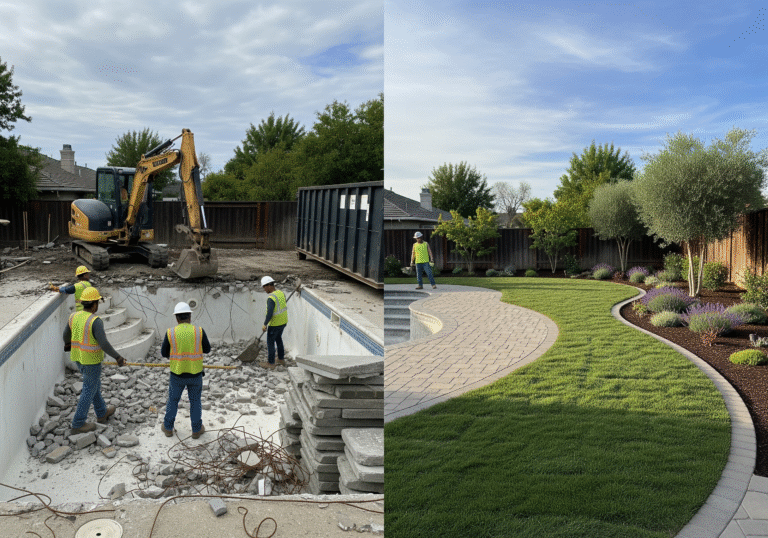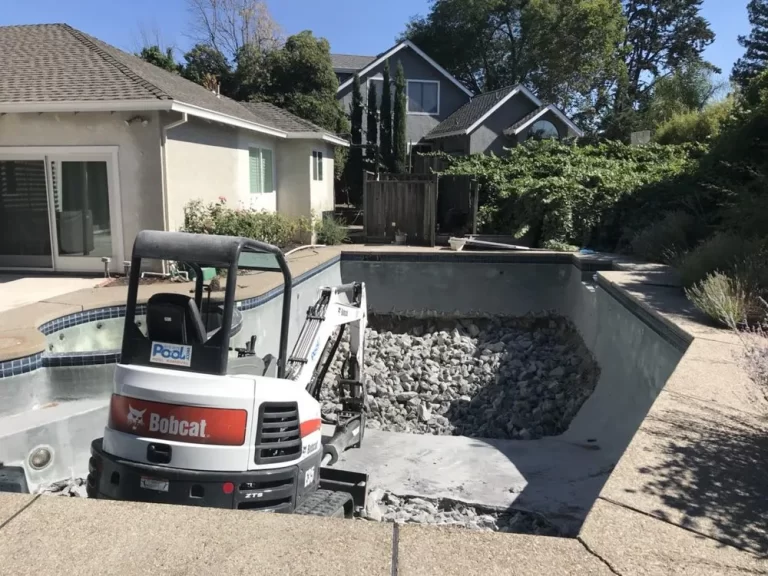Top Reasons to Remove Your Pool: Weighing the Pros and Cons
Many homeowners are rethinking the value of having a swimming pool. Removing your pool can save a significant amount of money on maintenance and repairs. The constant need for cleaning, chemical balancing, and fixing leaks can add up fast.
Another reason to consider pool removal is safety. With children or pets around, pools can be a constant source of worry. Taking the pool out can create a safer environment.
Lastly, repurposing the space offers new opportunities for your backyard. Imagine a lush garden, a play area for kids, or even an outdoor dining space instead of a pool that goes unused. Removing your pool opens up these possibilities.
Assessing the Need for Pool Removal
Homeowners often consider removing their pools due to high maintenance costs, safety issues, and the need for more yard space.
Evaluating Maintenance Costs and Effort
An inground pool requires regular pool maintenance, including cleaning filters, checking chemical levels, and servicing equipment. These tasks can be time-consuming and require significant expense. Many homeowners find that the effort and money spent on upkeep outweigh the benefits of having a pool. Additionally, hiring professionals for regular pool maintenance further increases costs, making pool ownership less appealing over time.
Understanding Safety Concerns
Safety and liability concerns are crucial for homeowners, especially those with children or pets. Pools can be hazardous if not properly fenced and supervised. Unwanted accidents can lead to severe injuries or even fatalities. Furthermore, homeowners may face legal liabilities if someone gets hurt in their pool. To prevent accidents, extra safety measures like pool covers and alarms are necessary but can be costly.
Considering Space and Usability
Pools often take up a significant portion of backyard space. Homeowners who no longer use their pools may see this as wasted outdoor space that could be better utilized. Removing the pool can free up the yard for other activities such as gardening, play areas for children, or outdoor entertaining spaces. This change can make the yard more functional and increase the home’s overall appeal.
Logistical and Legal Considerations
Before removing a pool, it is crucial to address important logistical and legal factors. These include understanding necessary permits and regulations and selecting an appropriate removal method.
Understanding Removal Permits and Regulations
When removing a pool, permits and regulations vary by location. Local governments may require permits for draining the pool, demolishing structures, and disposing of materials. It’s important to research local guidelines to avoid penalties.
Permits ensure that the removal complies with safety and environmental standards. Homeowners should consult their local building department for specific requirements. Hiring a reputable pool removal contractor can simplify this process, as they are familiar with the necessary paperwork and procedures.
Choosing the Right Pool Removal Method
Choosing the right method for pool removal depends on factors like pool type and future land use. Generally, two main methods are used: full removal and partial removal.
- Full removal: This involves demolishing and removing the entire pool structure, including the concrete or fiberglass shell. Full inground pool removals are completed by breaking up the pool, hauling away debris, and backfilling the area.
- Partial removal: This method removes only the top portion, leaving the bottom in place. After demolishing the top, the pool is backfilled with soil and compacted.
Both methods require careful planning and coordination with a contractor experienced in pool removals. Homeowners should consider costs, time, and their intended use for the space when deciding on a method.
Impact on Property and Future Projects
Removing a pool can affect property value and open up new opportunities for landscaping and renovations. It can make the backyard more valuable or ready for future projects.
Understanding the Effects on Property Value
The impact of pool removal on property value varies. In some markets, homes without a pool can sell more quickly and appeal to families with young children or those looking for lower maintenance costs.
Pools can be expensive to maintain. They require regular cleaning, repairs, and can increase insurance premiums. Removing a pool can lower these costs, making the home more attractive to buyers who are budget-conscious.
Having a pool can turn off potential buyers in regions where pools are less common. This might reduce the perceived value of the property. On the flip side, in areas where pools are popular, removal can decrease the home’s appeal and market value.
Opportunities for Landscaping and Renovation
Taking out a pool opens up space in the backyard for new possibilities. Homeowners can design gardens, add patios, or install grassy areas. This gives the property a refreshed look and can make it more enjoyable.
The open space allows for creative landscape design. Consider adding a vegetable garden or a beautiful flower bed. These features can increase the property’s charm and attract prospective buyers who value outdoor living spaces.
Another option is to build a patio. This can provide a great place for family gatherings or outdoor dining. It’s a feature many buyers find appealing, and it can increase the usability of the outdoor space.
Grass is also an excellent choice. A lawn can be a play area for kids or pets, and it requires less upkeep and expense compared to a pool.
Innovative landscaping ideas can transform the space into a peaceful retreat. Whether through adding trees, creating walking paths, or installing water features, the possibilities are endless. This flexibility can significantly enhance the property’s overall value and future marketability.
Environmental Considerations and Final Thoughts
When a pool is removed, there are important environmental factors to think about. These include how to dispose of the materials responsibly and how to take care of the space in the future.
Eco-Friendly Disposal and Material Recycling
Removing a pool involves handling various materials like concrete, metal, and plastic. It’s essential to dispose of these materials in an eco-friendly manner. Recycling concrete and metal reduces waste and can even be reused in landscaping projects.
Concrete can often be crushed and used as gravel or drainage material in landscaping. Metal parts like ladders and rails can be taken to a recycling facility. Avoid sending debris to the landfill by finding companies that specialize in recycling pool materials.
Where possible, separate debris into categories: concrete, metal, plastic, and other materials. This makes it easier to recycle and reduces the environmental burden. By responsibly managing pool debris, the impact on the earth can be minimized.
Future Maintenance and Upkeep of the Space
Once the pool is gone, the newly available space needs proper maintenance. This new area can be transformed into a patio, shed, grass area, or other uses, but it will require planning and care.
If converting to a grass area, ensure the soil is well-prepared. Adding gravel and dirt connections can improve drainage. For a patio or shed, make sure the foundation is solid.
Future upkeep of this space includes regular landscaping, checking for proper drainage, and dealing with any leftover pool equipment. Maintenance may require new tools and materials, but taking these steps will help make the area functional and attractive.



![7 Powerful Steps to Prepare for a Successful Pool Demolition Project in California [Checklist]](https://byebyepools.com/wp-content/uploads/2025/04/7-Powerful-Steps-to-Prepare-for-a-Successful-Pool-Demolition--768x512.jpg)

